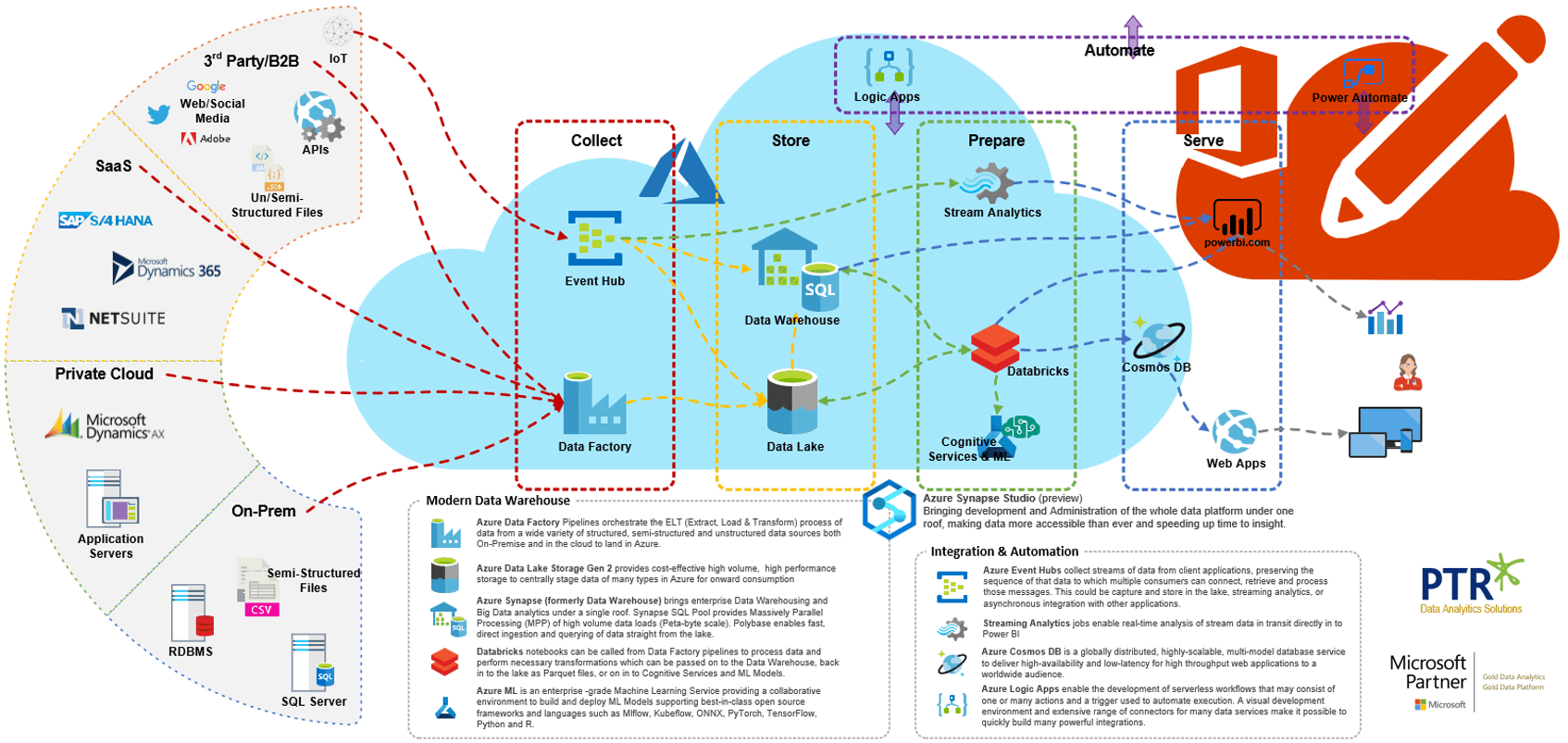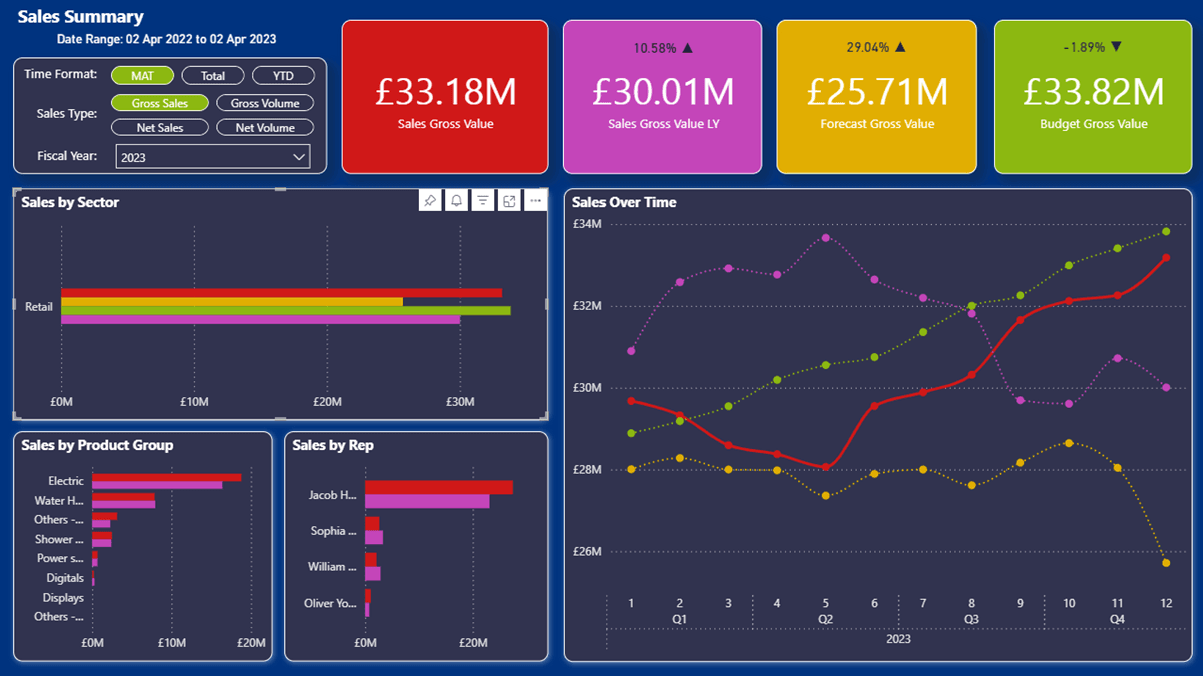Data Insights
The Role of AI in Business Intelligence
How can Artificial Intelligence (AI) Help You? Data is a key business asset, and it’s all around us. But you need a robust data strategy to really get the most out of it. Here’s why… The quantity of data generated on a daily basis is staggering and it’s b


Introduction to AI and BI
In today's business world, the significance of data is undeniable. It has become the lifeblood of organisations, driving strategic decisions and shaping the future of enterprises. This is where Business Intelligence (BI) comes into the picture. BI is a technology-driven process that leverages data to provide a panoramic view of a business's operations, thereby enabling informed decision-making. However, as we continue to advance technologically, the way we interpret and utilise data is also evolving. The latest catalyst for this change? Artificial Intelligence (AI).
AI, with its capacity to replicate human intelligence and automate complex processes, is causing a seismic shift across various industries, and BI is no exception. The incorporation of AI into BI is not merely about automating data analysis. It's about offering predictive insights, enhancing the quality of data, personalising the user experience, and much more. The fusion of AI and BI is ushering in a new era where data analysis is not just about comprehending past and present business scenarios, but also about accurately forecasting future trends.
Among the technology giants spearheading this revolution, Microsoft stands tall with its array of AI technologies designed to augment BI. From Azure Machine Learning to Power BI and Azure Cognitive Services, Microsoft is leading the charge in integrating AI into BI, offering tools that are not only potent but also user-friendly.
In this blog post, we will delve into the role of AI in Business Intelligence, explore the key AI technologies offered by Microsoft, and examine how they are shaping the future of BI. Whether you're an experienced data scientist, a business analyst, or a decision-maker looking to harness the power of data in your strategy, this exploration will illuminate the exciting possibilities that exist at the confluence of AI and BI.
The Confluence of AI and BI
As we progress further into the digital epoch, the boundaries between Artificial Intelligence (AI) and Business Intelligence (BI) are progressively dissolving. The amalgamation of these two potent technologies is revolutionising the modus operandi of businesses, proffering unparalleled opportunities for growth and innovation.
At its essence, BI is about harnessing data to glean insights into business operations, thereby equipping decision-makers with the knowledge to understand past and present performance and make informed decisions. Traditionally, this process entailed manual data analysis and reporting, which could be laborious and susceptible to errors. However, the advent of AI has brought about a paradigm shift in this process.
AI introduces advanced capabilities such as machine learning, natural language processing, and predictive analytics, which can automate and enhance various facets of BI. For instance, machine learning algorithms can scrutinise vast amounts of data far more swiftly and accurately than a human could, pinpointing patterns and trends that might otherwise remain undetected. Natural language processing enables users to interact with BI systems using colloquial language, making these systems more accessible and user-friendly. Predictive analytics utilises historical data to forecast future trends, empowering businesses to anticipate changes and stay ahead of the competition.
The integration of AI into BI also paves the way for prescriptive analytics, which goes a step beyond predictive analytics. While predictive analytics can forecast potential future occurrences, prescriptive analytics suggests actions that could be taken to capitalise on these predictions.
This can be a game-changer for businesses, enabling them to make proactive decisions and gain a competitive edge.
Microsoft, with its suite of AI technologies, is at the forefront of this AI and BI convergence. Their tools, such as Azure Machine Learning and Power BI, are designed to make the power of AI accessible to businesses of all sizes, aiding them in transforming their BI strategies and driving success in the digital age. In the subsequent sections, we will delve deeper into these technologies and examine how they are shaping the future of BI.
Microsoft's AI Technologies for BI
Microsoft has long been a pioneer in the realm of AI, developing a suite of technologies that are transforming the approach businesses take towards BI. Let's delve deeper into some of these pivotal technologies and their contribution to the AI-BI landscape.
Azure Machine Learning
This cloud-based service is engineered to empower developers and data scientists with a diverse range of productive experiences for constructing, training, and deploying machine learning models more swiftly. It simplifies the process of building and deploying models, allowing businesses to harness the power of machine learning without the need for a team of specialists. With Azure Machine Learning, businesses can automate data analysis, predict trends, and make data-driven decisions more efficiently.
Power BI
Power BI is a potent BI tool that provides interactive visualisations and business intelligence capabilities with an interface that is easy to use for creating reports and dashboards. It has integrated AI capabilities that allow users to access image recognition and text analytics, create machine learning models, and integrate with Azure Machine Learning. This means businesses can use Power BI to not only visualise their data but also to gain deeper insights and make predictions.
Azure Cognitive Services
These services provide developers with APIs and models to add intelligent features to their applications without needing extensive AI expertise. They cover a wide range of capabilities including vision, speech, language, and decision-making. For instance, a business could use Azure Cognitive Services to analyse customer feedback, identify key themes, and determine sentiment, providing valuable insights that could drive business strategy.
Azure Databricks
This is an Apache Spark-based analytics platform optimised for the Microsoft Azure cloud services platform. It provides a collaborative environment for data scientists, data engineers, and business analysts to work together. With Azure Databricks, businesses can process large volumes of data in real-time, making it easier to identify trends and make timely decisions.
Azure Synapse Analytics
This integrated analytics service brings together big data and data warehousing, allowing businesses to explore, clean, and transform their data in preparation for machine learning and other advanced analytics. It's a powerful tool for businesses looking to leverage their data to its full potential.
Azure Bot Service
This service enables developers to build, deploy, and manage intelligent bots all in one place. While not traditionally associated with BI, bots can play a role in areas like customer service, where they can analyse and respond to customer queries, providing valuable insights into customer needs and behaviours.
Azure Data Lake Analytics
This on-demand analytics job service simplifies big data. Instead of deploying, configuring, and tuning hardware, you write queries to transform your data and extract valuable insights. This simplifies the process of analysing large volumes of data, making it more accessible to businesses of all sizes.
Each of these technologies plays a unique role in the AI-BI landscape, offering different capabilities that can enhance a business's BI strategy. By leveraging these technologies, businesses can harness the power of AI to gain deeper insights, make more informed decisions, and drive their success in the digital age.
The Future of AI in BI
The fusion of AI and BI is not merely a theoretical concept; it's a tangible reality that's already bringing about transformative changes in businesses across a variety of sectors. Let's explore some practical applications of how companies are utilising Microsoft's AI technologies in their BI strategies.
Predictive Maintenance with Azure Machine Learning
Manufacturing firms are utilising Azure Machine Learning to anticipate equipment failures before they occur. By analysing historical data on equipment usage and maintenance, machine learning models can identify patterns that indicate a potential failure. This enables companies to carry out maintenance proactively, reducing downtime and saving costs.
Customer Insights with Power BI and Azure Cognitive Services
Retail businesses are employing Power BI in conjunction with Azure Cognitive Services to gain deeper insights into their customers. For instance, they might use text analytics to analyse customer reviews and feedback, identifying key themes and sentiments. This can assist businesses in understanding what their customers value and where there's room for improvement.
Real-time Analytics with Azure Databricks
Financial institutions are utilising Azure Databricks to process large volumes of data in real-time. This enables them to identify trends and make timely decisions, which is crucial in the fast-paced world of finance. For example, they might use real-time analytics to detect fraudulent transactions as they occur, preventing losses.
Data Warehousing with Azure Synapse Analytics
Numerous businesses are utilising Azure Synapse Analytics to bring together their big data and data warehousing. This enables them to explore, clean, and transform their data in preparation for machine learning and other advanced analytics. For instance, a healthcare organisation might use Azure Synapse Analytics to analyse patient data and identify trends that could improve patient care.
These examples illustrate the transformative potential of integrating AI into BI. By leveraging Microsoft's AI technologies, businesses can not only improve their current operations but also uncover new opportunities and drive innovation.
AI & BI Summary
As we've seen, the integration of AI into BI is transforming the way businesses operate, offering unprecedented opportunities for growth and innovation. However, navigating this new landscape can be challenging. That's where PTR comes in.
At PTR, we have the knowledge and experience to help you harness the power of Microsoft's AI technologies and integrate them into your BI strategy. Whether you're looking to implement machine learning with Azure, visualize your data with Power BI, or leverage the power of Azure Cognitive Services, we can guide you every step of the way.
We understand that every business is unique, and we specialise in supplying tailored solutions that meet your specific needs. Our team stays up to date with the latest methodologies and products, ensuring that you get a reliable assessment of the best current offerings. We're passionate about what we do, and our goal is to help you improve your business productivity.
Ready to take your BI strategy to the next level? Please get in touch to find out how we can help you utlilise the power of AI in your business.
Share This Post
Brett Valentine-Dunn
Senior Business Intelligence Consultant
Brett has been working in data and analytics for a decade, and has helped many SMEs transform their businesses by harnessing the power of data and business intelligence.
Frequently Asked Questions
Couldn’t find the answer you were looking for? Feel free to reach out to us! Our team of experts is here to help.
Contact Us


